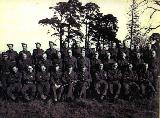|
 
In 1940 there were large ammunition depots in places like Woolwich. These depots were within reach of the German Luftwaffe and therefore in danger of air attack. A decision was made by the authorities to disperse the ammunition throughout the country side where it could be better protected. Santon Downham was chosen as one of these locations. For the duration of the war the village became an ammunition depot with a detachment of the Royal Ordnance Corp in charge. This brought about a dramatic change to the every day life of the residents especially as soldiers and officers were billeted in their homes.
Mr. and Mrs. Carter who had three children; Michael, Brenda and Dawn had six men living with them. Only very large families like the Ashleys with fourteen children did not have to house soldiers.
The first soldiers to arrive in the village were Royal Engineers who built the army camp amongst the existing houses. These buildings were constructed of wooden sections set on concrete bases. The dinning hall, which was also used for social events was located near the Billiard Room. There was a large cookhouse a sergeants' mass, barrack blocks and a shower unit for the soldiers.
Listen to camp288.mp3
An assault course was set up in front of the churchan area now occupied by part of the village green. There were two air raid shelters in the village. One was the Ice House and the other was a cellar under the old barn and Water tower, which stood near the site of the present Forestry Office. Michael Carter remembers the arrival of the ammunition-"Everywhere was full of ammunition. In the woods, every few yards. Convoys of lorries bringing stuff in and taking stuff out. It was continuous. All day and all night."
|
|
|
The army blocked off both ends of the village with gates and armed guards. Villagers were issued with identity cards which they had to show when they entered the village. In spite of all these disruptions to every day life there were very happy memories of the war years in Santon Downham.
Listen to guarded288.mp3
As children, Brenda Largent, Michael Carter her brother, and Bernard Ashley who were born in Santon Downham, remember the social events and the treats they were given in the cookhouse by the soldiers. The Americans who were stationed at Elveden invited the children of Santon Downham to a Christmas party and even provided transport for the occasion. On Saturdays the children helped to sort out salvage. Nothing was wasted. Paper, glass, metal etc. were collected and recycled. Attendance at church on Sundays was compulsory and Bernard was given the task of pumping the church organ. They all went to school in Brandon where they remember having to do gas mask drill! Members of the Women's Voluntary Service helped in the general running of the village. Members of the Home Guard also had their duties and met regularly in the Carter's house.
Paraffin lamps lighted homes, and the laundry was done using old coppers and flat irons as there was no gas or electricity. There were no bathrooms or indoor toilets in the houses .An old tin bathtub in the middle of the kitchen floor was used on bath nights and several people had to share the same water.
|
|
|
Brenda remembers using the old tin bath as a sledge in winter.
Listen to tinb288.mp3
Although there was rationing, the villagers did not go short of food. The Carters kept chickens rabbits and goats. Mr.Carter cultivated a large vegetable garden. There were cows in the village to provide milk. The only things that were in short supply were imported goods such as tea and sugar. Each child was given an orange at Christmas but fruit such as bananas were not available. When the war ended all the people celebrated by doing a Conga around the village.
May 8, 1945, was a joyous occasion with coloured smoke flares. Gradually the restrictions were lifted, although rationing remained for some years. Many of the soldiers kept in touch with friends they had made in Santon Downham during the war years and returned to visit them from time to time.
|
|
|
|
|
|
|
|
|
|
|
|
|
Copyright 2016 TJKSoftware,Icehouse Media, ~ designed & maintained by
TJKSoftware

